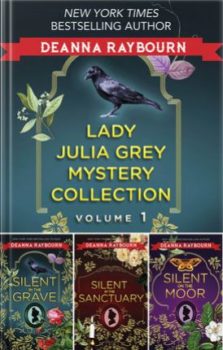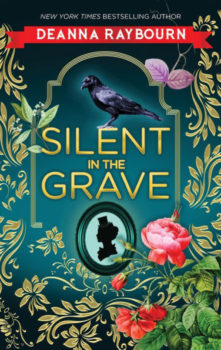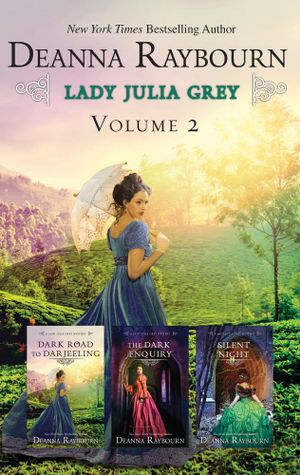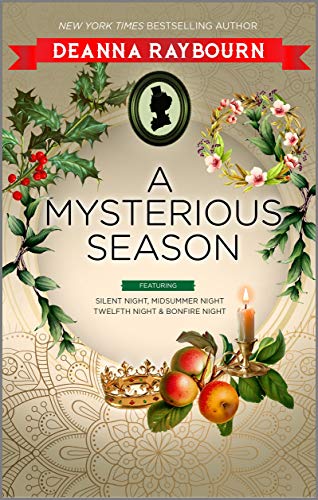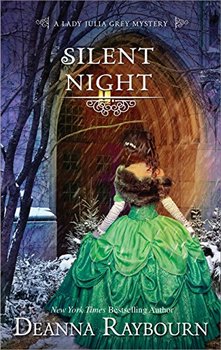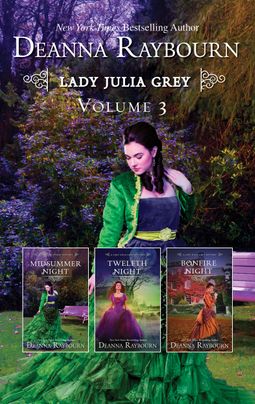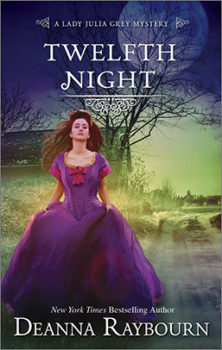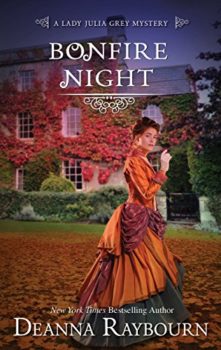
Lady Julia Grey Mysteries #5
October 1, 2015
The Dark Enquiry
Recapture the mystery and magic of Lady Julia Grey with book 5 in Deanna Raybourn’s fan-favorite series.
Partners now in marriage and in trade, Lady Julia and Nicholas Brisbane have finally returned from abroad to set up housekeeping in London. But merging their respective collections of gadgets, pets and servants leaves little room for the harried newlyweds themselves, let alone Brisbane’s private enquiry business.
Among the more unlikely clients: Julia’s very proper brother, Lord Bellmont, who swears Brisbane to secrecy about his case. Not about to be left out of anything concerning her beloved—if eccentric—family, spirited Julia soon picks up the trail of the investigation.
It leads to the exclusive Ghost Club, where the alluring Madame Séraphine holds evening séances…and not a few powerful gentlemen in thrall. From this eerie enclave unfolds a lurid tangle of dark deeds, whose tendrils crush reputations and throttle trust.
Shocked to find their investigation spun into salacious newspaper headlines, bristling at the tension it causes between them, the Brisbanes find they must unite or fall. For Bellmont’s sake—and more—they’ll face myriad dangers born of dark secrets, the kind men kill to keep….
Originally published July 2011 in trade paperback.
The First Chapter
-
- I will sit as quiet as a lamb.
King John
London, September 1889
“Julia, what in the name of God is that terrible stench? It smells as if you have taken to keeping farm animals in here,” my brother, Plum, complained. He drew a silk handkerchief from his pocket and held it to his nose. His eyes watered above the primrose silk as he gave a dramatic cough.
I swallowed hard, fighting back my own cough and ignoring my streaming eyes. “It is manure,” I conceded, turning back to my beakers and burners. I had just reached a crucial point in my experiment when Plum had interrupted me. The table before me was spread with various beakers and bottles, and an old copy of the Quarterly Journal of Science lay open at my elbow. My hair was pinned tightly up, and I was swathed from shoulders to ankles in a heavy canvas apron.
“What possible reason could you have for bringing manure into Brisbane’s consulting rooms?” he demanded, his voice slightly muffled by the handkerchief. I flicked him a glance. With the primrose silk swathing the lower half of his face he resembled a rather dashing if unconvincing highwayman.
“I am continuing the experiment I began last month,” I explained. “I have decided the fault lay with the saltpeter. It was impure, so I have decided to refine my own.”
His green eyes widened and he choked off another cough. “Not the black powder again! Julia, you promised Brisbane.”
The mention of my husband’s name did nothing to dissuade me. After months of debating the subject, we had agreed that I could participate in his private enquiry investigations so long as I mastered certain essential skills necessary to the profession. A proficiency with firearms was numbered among them.
“I promised him only that I would not touch his howdah pistol until he instructed me in the proper use of it,” I reminded Plum. I saw Plum glance anxiously at the tigerskin rug stretched on the floor. Brisbane had felled the creature with one shot of the enormous howdah pistol, saving my life and killing the maneater in as quick and humane a fashion as possible. My own experiences with the weapon had been far less successful. The south window was still boarded up from where I had shattered it when an improperly cured batch of powder had accidentally detonated. The neighbour directly across Chapel Street had threatened legal action until Brisbane had smoothed his ruffled feathers with a case of rather excellent Bordeaux.
Plum gave a sigh, puffing out the handkerchief. “What precisely are you attempting this time?”
I hesitated. Plum and I had both taken a role in Brisbane’s professional affairs, but there were matters we did not discuss by tacit arrangement, and the villain we had encountered in the Himalayas was seldom spoken of. I had watched the fellow disappear in a puff of smoke and the experience had been singularly astonishing. I had been impressed enough to want some of the stuff for myself, but despite numerous enquiries, I had been unsuccessful in locating a source for it. Thwarted, I had decided to make my own.
“I am attempting to replicate a powder I saw in India,” I temporised. “If I am successful, the powder will require no flame. It will be sensitive enough to ignite itself upon impact.” Plum’s eyes widened in horror.
“Damnation, Julia, you will blow up the building! And Mrs. Lawson dislikes you quite enough already,” he added, a trifle nastily, I thought.
I bent to my work. “Mrs. Lawson would dislike any wife of Brisbane’s. She had too many years of keeping house for him and preparing his puddings and starching his shirts. Her dislike of me is simple feminine jealousy.”
“Never mind the fact that you have created a thoroughly mephitic atmosphere here,” Plum argued. “Or perhaps it is the fact that you keep blowing out the windows of her house.”
“How you exaggerate! I only cracked the first lot and the smoke damage is scarcely noticeable since the painters have been in. As far as the south window, it is due to arrive tomorrow. Besides, that explosion was hardly my fault. Brisbane did not explain to me that sulphur is quite so volatile.”
“He is a madman,” Plum muttered.
I pierced him with a glance. “Then we are both of us mad as well. We work with him,” I reminded him. “Why are you here?”
Plum snorted. “A happy welcome from my own sister.”
“We are a family of ten, Plum. A visit from a sibling is hardly a state occasion.”
“You are in a vile mood today. Perhaps I should go and come again when you have sweetened your tongue.”
I carefully measured out a few grains of my newly-formulated black powder. “Or perhaps you should simply tell me why you are here.”
He gave another sigh. “I need to consult with your lord and master about the case he has set me. He wants me to woo the Earl of Mortlake’s daughter with an eye to discovering if she is the culprit in the theft of Lady Mortlake’s emeralds.”
I straightened, intrigued in spite of myself. “That is absurd. Felicity Mortlake is a thoroughly nice girl with no possible motive to stealing her stepmother’s emeralds. I am sure she will be vindicated by your efforts.”
“That may be, but in the meantime, I have to secure for myself an invitation to their country seat to make a pretense of an ardent suitor. This would have been far easier during the season,” he complained.
“Can you put the thing off?” I asked, wiping the powder from my hands with a dampened rag.
“Not likely. The emeralds are still missing, and Brisbane said Mortlake is getting impatient. Nothing has been proved of Felicity, but until his lordship knows something for certain, he cannot be assured of her innocence or guilt. One feels rather sorry for him. Of course, one ought rather to feel sorry for me. Felicity Mortlake detests me,” he said, pulling a woeful face.
I felt a smile tugging at my lips. “Yes, I know.” I remembered well the time she upended a bowl of punch over Plum’s head in a Mayfair ballroom. Not his finest moment, but very possibly hers.
I bent again to my experiment. “The French now have a smokeless gunpowder,” I mused, sulking a little, “and yet I still cannot manage to perfect this wretched stuff.”
Plum edged towards the door. “You do not mean to light that,” he said as I took up a match.
“Naturally. How else will I know if I am successful? You needn’t worry,” I soothed. “I have taken precautions this time,” I added, gesturing towards the heavy apron I had tied over my oldest gown. I had already ruined three rather expensive ensembles with my experiments and had finally accepted the fact that fashion must give way to practicality when scientific method was employed.
“I am not thinking of your clothes,” he protested, his voice rising a little as I struck the match and the phosphorus at the tip flared into life.
“If you are nervous, then wait outside. Brisbane will return shortly,” I said.
“Brisbane has returned now,” came the familiar deep voice from the doorway.
I looked up. “Brisbane!” I cried happily. And dropped the match.
The fact that the resulting explosion broke only one window did nothing to ameliorate my disgrace. Brisbane put out the fire wordlessly—or at least I think it was wordlessly. The explosion had left a distinct ringing in my ears. His mouth may have moved, but I heard nothing of what he might have said until we returned to our newly-let home in Brook Street that evening. Brisbane had ordered dinner served upon trays in our bedchamber, and I was glad of it. A long and fragrantly steamy bath had removed most of the traces of soot from my person, and as I approached the table, I realised I was voraciously hungry.
“Oooh! Oysters—and grouse!” I exclaimed, taking a plate from Brisbane. I settled myself happily, and it was some minutes before I noticed Brisbane was not eating.
“Aren’t you hungry, dearest?”
“I had a late luncheon at the club,” he said, but I was not deceived. He plucked a bit of meat from one of the birds and tossed it towards his devoted white lurcher, Rook. For so enormous a dog, he ate daintily, licking every bit of grease from his lips when he was finished with the morsel.
I laid down my fork. “I know you are not angry or you would be shouting still. What troubles you?”
He passed a hand over his eyes, and I felt a flicker of alarm lest one of his terrible migraines be upon him. But when he opened his eyes, they were clear and fathomlessly black and focused intently upon me.
“I simply do not know what to do with you,” he said. For an instant I felt sorry for him.
“Four explosions in a month’s time are a bit excessive,” I conceded.
“Five,” he corrected. “You forgot the house party at Lord Riverton’s estate.”
“Oh, would you call that an explosion? I should have called it a detonation.” I picked up my fork again. If we were going to retread the same ground in this argument, I might as well enjoy my meal. “The oysters are most excellent. Pity about Cook giving notice in order to live in the country. We shall never find another half so skilled with shellfish.”
Brisbane was not distracted by my domestic chatter. “Regardless. We must do something about your penchant for blowing things up, my lady.”
The fact that Brisbane used my title was an indication of his agitated state of mind. He never used it in conversation, preferring instead to employ little endearments, some of which were calculated to bring a blush to my cheek.
He poured out the wine and took a deep draught of it, then loosened his neckcloth, an act of dinner table impropriety that would have affronted most other wives, but which I strongly encouraged. Brisbane had a very handsome throat.
I applied myself to the grouse again. “It is the same dilemma that always afflicts us,” I pointed out. “I want to be involved in your work. You permit it—against your better judgment—and somehow it all becomes vastly more complicated than you expected. Really, I do not know why it should surprise you anymore.” After four cases together, including unmasking the murderer of my first husband, it seemed ludicrous that Brisbane could ever think our association would be simple.
He sighed deeply. “The difficulty is that I seem entirely unable to persuade you that dangers exist in the world. You are more careless of your personal safety than any woman I have ever met.”
Considering how many times I had directly approached murderers with accusations of their crimes, I could hardly fault Brisbane for thinking me feckless.
I put a hand to his arm. “You understand I do not mean to be difficult, dearest. It is simply a problem of enthusiasm. I find myself caught up in the moment and lose sight of the consequences.”
His witch-black eyes narrowed dangerously. “Then we must find you another enthusiasm.”
I knew that half-lidded look of old, and I crossed my arms over my chest, determined not to permit myself to be seduced from the discussion at hand. Brisbane was adept at luring me out of difficult moods with a demonstration of his marital affections. Afterward, I seldom remembered what we had been discussing, a neat trick which often provided him a tidy way out of a thorny situation. But not this time, I promised myself.
I tore my glance from the expanse of olive-brown throat, and met his gaze with my own unyielding one.
“We cannot spend the whole of our marriage having the same argument, although I realise there are one or two issues which remain to be settled,” I conceded.
We had been married some fifteen months, but our honeymoon had been one of long duration. We had returned to London some weeks past. Since then we had found a house to let and moved many of his possessions from his bachelor rooms in Chapel Street and mine from the tiny country house on my father’s estate in Sussex. We had hired staff, ordered wallpaper, purchased furniture, and bored ourselves silly in the process. We wanted work, worthwhile occupation, cases to solve, puzzles to unravel. He had retained his flat in Chapel Street as consulting rooms and space for experiments with an eye to keeping our professional endeavours separate from our private lives, but I was growing restless. He had already tidied away three major cases since our return, and I had been given nothing more engaging to solve than the mystery of why the laundress applied sufficient starch to only five of the seven shirts he sent out.
“But you promised to let me take part in your work,” I reminded him. “I am doing my best to learn as much as I can to make you a good partner.” I hated the pleading note that had crept into my voice. I stifled it with a bit of bread roll as he considered my words.
“I know you have,” he said at length. “No one could have worked harder or with great enthusiasm,” he conceded, his lips twitching slightly as he held back a smile. “And that is why I think it is time you embarked upon your first investigation.”
“Brisbane!” I shot to my feet, upsetting the little table, and in an instant I was on his lap, showering him with kisses. Rook took advantage of the situation to browse amongst the litter of china and food. He dragged away a grouse to gnaw upon, but I did not scold him. I was far too happy as I pressed my lips to Brisbane’s cheek. “Do you mean it?”
“I do,” he said, somewhat hoarsely. “Plum must pursue the Mortlake girl, and I want you to go with him. You are acquainted with the family. It will seem more natural if you are there. And Lord Mortlake suspects the theft of the emeralds to be a feminine crime. You will be invaluable to Plum as a finder-out of lady’s secrets.”
I ought to have been thoroughly annoyed with him that he considered me fit only for winkling out backstairs’ gossip, but I was too happy to care. At last, Brisbane had accepted me as a partner in the fullest sense of the word.
“You will not regret it,” I promised him. “I shall recover the emeralds and unmask the villain for Lord Mortlake.”
“I shall hold you to that,” he murmured, pressing his mouth to the delicate pulse that fluttered at my neck. Dinner was forgot after that, and some time later, as I drifted off to sleep, Brisbane’s heavily-muscled arm draped over me, I mused on how successfully we were learning to combine marriage with business. It wanted only a little patience and a little understanding, I told myself smugly. I had proven myself to him, and he had full faith in my abilities to assist in an investigation.
I ought to have known better.
Things had already begun to unravel the next morning. I hurried down to breakfast in high spirits and brimming with plans for my time at the Mortlakes. I could hardly wait to discuss them with Brisbane over a delectable meal in our pretty breakfast room. With robin’s egg blue walls and thick velvet draperies hung at long windows that overlooked the back garden, it made a calm and pleasant room to begin one’s day. Only the enormous cage that housed our raven, Grim, struck an incongruous note, but I was very fond of the fellow, and he in turn was very fond of the titbits I passed along.
I descended to the hall just as our butler emerged from the green baize door separating the kitchens from the rest of the house.
“Good morning, Aquinas.”
“My lady,” he returned with a bow from the neck. Even carrying a rack of toast, he managed a grave dignity.
“How is the hiring coming along? Have you found a replacement for Cook yet?” Aquinas had been with me for years, first as butler at Grey House during my previous marriage, and later as my own personal retainer. My faith in him—and my boredom with domestic arrangements—was immense. I had left the staffing of the new house entirely in his hands, instructing him to use Mrs. Potter’s, one of London’s most fashionable agencies to supply us. The results had been middling at best.
“I have engaged a replacement for Cook, and she has prepared breakfast,” he informed me with a little moue of distaste at the slightly burnt toast in the rack.
I raised my brows. “I have never known you to bring burnt toast to the table, Aquinas. I gather this is not her first attempt?”
“Fourth,” he said tightly, “and this was by far the best. I did not wish to delay you or Mr. Brisbane by pressing the matter further, but I will speak with her directly breakfast is over. I have also taken the liberty of engaging another chambermaid in light of Mr. Eglamour March’s arrival.”
I went quite still at the mention of my brother. “Mr. Eglamour?” Eglamour was Plum’s Christian name and one that was never used except by the staff and polite society.
“Mr. Brisbane informed me yesterday that Mr. Eglamour March will be taking up residence here shortly. I thought perhaps the Chinese Room would do nicely for him as it has its own dressing room. I also thought the southern light would be quite suitable should he care to pursue his painting.”
Southern light indeed, I thought with pursed lips. As the fourth—and therefore almost entirely useless—son of an earl, Plum had amused himself with art before taking up detection, and privately I thought him quite talented. But neither of those pursuits called for him to live under my roof.
I plucked the toast rack out of Aquinas’ hands. “I will take this in, if you don’t mind. I should like to have word with Mr. Brisbane.”
Aquinas withdrew to fetch the tea and I girded myself for battle. I did not have long to engage. One look at my face when I entered the breakfast room and Brisbane threw up his hands.
“I know. It is not ideal. He did not like to tell you, but Plum has had a falling out with your father.”
A little of the wind ebbed out of my sails then. I put the toast rack onto the table and went to open Grim’s cage. He gave me a polite bob of the head.
“Good morning,” he said in his odd little voice. I returned the greeting, and Grim dropped to the floor to pace the room, peering into corners and making his morning inspection. I broke up a piece of toast for him and put it onto a saucer on the floor before helping myself. I turned to Brisbane. “They have quarrelled over his role in your business, I presume?”
Brisbane nodded. “His lordship does not find the endeavour suitable to one of Plum’s elevated birth,” he said lightly, but I wondered if he felt the sting of Father’s disapproval. It was terribly ungrateful of Father, really. Brisbane had saved his life upon one occasion and the family honour more than once.
“I did warn you he would be difficult,” I murmured. “Particularly just now. Portia says he has been feuding terribly with Auld Lachy.” Father’s quarrels with his hermit had become so heated Homer could have written an epic poem upon the subject. It had not helped matters when I put it to Father that it was an absurd notion to keep one’s hermit in town in the first place. But it was no more than Father ought to have expected. He had hired Auld Lachy from a newspaper advertisement, and as I had reminded him, one ought never to hire a hermit without proper references.
I took up a knife and a piece of toast and began to scrape off the burnt bits. Grim had studiously ignored his. I dolloped a bit of quince jam onto his saucer and he bobbed his head happily. “That’s for me,” he said before applying himself to tearing into his breakfast. He had none of Rook’s dainty ways when it came to food. I added some jam to my own sad, sooty piece of toast and resumed the theme of the conversation.
“The thing you must remember about Father is that he is the most terrible hypocrite. He reared us all with his Radical ideals, and yet he does not actually believe them, at least not as they apply to his children.”
“He gave his blessing to our union,” Brisbane pointed out calmly.
I gave him a fond smile. “Father doesn’t care over much what the girls do so long as we are happy and don’t make too much of a scandal. It is his sons he frets about. Between Bellmont’s turning out Tory and Valerius practicing medicine, he feels the disapppointment of his heirs keenly.”
Poor Father had not had an easy time of it with his sons. For the most part, those who had married had married well, but his eldest and the heir to the earldom—Viscount Bellmont—was a force for the Tories. The youngest, Valerius, had taken up as a consulting physician, and Lysander and Plum dabbled in the arts. Only Benedick who ran the Home Farm at the family seat in Sussex was a source of pride and comfort to him. Father admired Brisbane’s dash and cleverness, but their relationship was a prickly one, with Father blowing hot then cold, and Brisbane always maintaining a courteous—-if advisable—distance.
I bit into my toast, chewing thoughtfully. “And I suspect it was your ducal connections that allayed any doubts he might have had. He really is the most frightful snob, the poor darling.”
Brisbane’s elderly great-uncle was the Duke of Aberdour, a connection that served to ameliorate the fact that his mother had been a Gypsy fortuneteller and his father—well, the less said about him, the better.
I went on. “But Father’s disapproval is not the issue at hand. Why is Plum moving in with us? There is the small bedchamber in the consulting rooms in Chapel Street. He can stay there,” I suggested. Grim quorked impatiently for another piece of toast and I obeyed.
Brisbane picked up his newspaper. “I am afraid that won’t do. Monk is using the room at present.”
I sighed at the mention of Monk. Once Brisbane’s tutor and later his batman—a connection I still meant to explore as neither of them would ever speak of their time in the army—Monk served as Brisbane’s right-hand during investigations. He had taken a liking to me upon our first meeting. Since then, our relationship had been coolly polite. I had supplanted his role as Brisbane’s confidant and I think he felt the loss of their former closeness sharply. It was entirely supposition on my part, for the subject was never discussed, but Monk had made a habit of absenting himself as much as possible and treating me with detached cordiality when our meeting was unavoidable.
Brisbane had an uncanny ability to intuit my thoughts at times. “He will come round,” he said, his voice gentle. I gave him a weak smile.
“I hope so. It is quite lowering enough that Mrs. Lawson has decided to hate me.”
Brisbane did not dispute the point, and I made a mental note to be more discreet during my visits to Chapel Street. I really had made life very difficult for Mrs. Lawson with my experiments, and it would not do to alienate everyone from Brisbane’s bachelor days.
“Well, Aquinas said he will put Plum in the Chinese Room and he has already engaged another maid, so I suppose it is a fait accompli. Although,” I added, brightening, “I do not see why he could not take the attics in Chapel Street.” Upon our return from abroad, we had taken over the floor above Brisbane’s rooms. It was admirable space for storage, but could easily be fitted out for Plum’s comfort, and the place would be far larger than what we could offer him.
“Impossible,” Brisbane said, folding his newspaper with a snap. “I have plans for the attics.”
“But, Brisbane, really—”
He rose and dropped a kiss to the top of my head. “I thought it would make the perfect space for you to pursue photography. In fact, the equipment is due to arrive whilst you are at the Mortlakes. By the time the case is concluded and you return to town, you will have your own photographic studio complete with dark room.”
“Brisbane!” I flung my arms about his neck for the second time in as many days. “You astonish me. I have not mentioned photography in weeks.” I had been intrigued by the work of a lady photographer we had met during our last investigation and had longed for a camera of my own. I admired the ease with which it combined both science and art, and with my extensive family I knew I should never lack for subjects or inspiration.
He kissed me firmly. “Yes, well, I knew you would enjoy it, and I think it will prove quite useful during investigations to have our own means of taking photographs. If you have a talent for it, it may well provide you with a part of the business that is entirely your own.”
I was dazzled at the notion of having something that was both useful and completely mine. I could contribute now, really contribute, and I promised myself that I would succeed. I had applied myself diligently to the other subjects Brisbane had set me, but that would be nothing to my study of photography. I would earn my position in the agency, I vowed, and so delirious was I at the prospect, I scarcely listened as he went on.
“There will be workmen about, partitioning off the space for the dark room and fitting tables and shelves and whatnot, so you will want to keep clear of the place today. When you return from the country, you can make a proper inventory and if there is anything I have missed out, you can order it.”
I said nothing for a moment. I rose to survey the dishes on the sideboard and found them distinctly uninspiring. I took a kidney for Grim as they were a special treat, but the rest of the dishes did not tempt me. I placed the kidney on Grim’s saucer and clucked to him. He trotted to it and applied himself greedily. I ran a finger down his silky dark head, studying the flash of green in the depths of his black feathers. “When do Plum and I leave for the country, dearest?”
“The Mortlakes are hosting a house party beginning tomorrow. The country house is just in Middlesex. Take the late afternoon train out of Victoria Station, and you should easily arrive at Mortlake’s estate by teatime. Does that suit?”
I turned back to stare into those guileless, handsome black eyes and smiled widely. “Of course, but if I am to leave tomorrow, I must shop! I will likely be quite late to dinner tonight. And I must call in on Portia before I go.”
He kissed the top of my head again and left, and as he quit the room, I could not help feeling the relief rolling from him in waves. Aquinas entered then with a pot of tea.
“Mr. Brisbane has left then, my lady?”
“He has,” I said, musing quietly. Aquinas puttered for a moment, returning Grim to his cage and tidying up the dishes upon the sideboard.
“The eggs are watery and the porridge was a lump,” I told him. “Give the new cook another day, and if she does not improve, you must return to Mrs. Potter’s and find us another,” I instructed.
“She has already given notice,” he informed me.
“What notice? She only started this morning.”
“She means to leave by luncheon today.”
“She has given us three hours’ notice?”
“It would appear so, my lady.”
I sighed heavily. “What was the trouble with this one?”
“She was frightened of the new stove.”
I suppressed the urge to snort. The stove had been an extravagance, the latest in domestic technology and Brisbane had insisted upon it. He adored gadgetry of any kind, and as soon as he had clapped eyes upon the great rusting monstrosity in the kitchen, he had demanded it be ripped out and replaced with the very newest and most expensive model. The difficulty was that most cooks were an old-fashioned lot and did not care for change. For a woman trained to prepare meals upon a coal or wood fire, cooking upon a gas stove was a terrifying proposition. I flapped a hand at Aquinas. “I will leave it to you to send to Mrs. Potter’s for another. I have much to do today.”
“Very good, my lady.”
I turned my last two conversations with Brisbane over carefully in my mind, then directed Aquinas to find my maid.
“Send Morag to me, would you? I must discuss the packing list with her.”
“For the trip to the country? Very good, my lady.”
“Not at all,” I said, holding up my cup for more tea and baring my teeth in a smile. “I have absolutely no intention of going to the country.”
© Reprinted by permission. All rights reserved.
back to Top
- This novel sees the return of Nicholas and Julia to London after their exotic and extended honeymoon. How does the setting influence the story?
- What are the most significant challenges facing Nicholas and Julia as they settle into married life?
- How does Plum’s presence in the enquiry agency change the dynamic of the working relationships?
- With her lack of interest in domestic details, Julia is not a typical Victorian housewife. How does she resist this role?
- Several new characters are introduced in this book—most signifcantly, Sir Morgan Fielding. Describe his relationship to the established characters and what role he might play in the future.
- Nicholas reveals more of his past to Julia in this novel. What does he reveal and how might it affect their relationship?
- How do the Roma characters fit your perception of Gypsies? How do they differ? How does Granny Bones fit into the development of Nicholas’ character?
- What are the difficult lessons learned by Lord Bellmont in this story?
- How does Julia’s extensive and eccentric family fit into her life? How do they intrude?
- What motivates Lady Felicity Mortlake?
